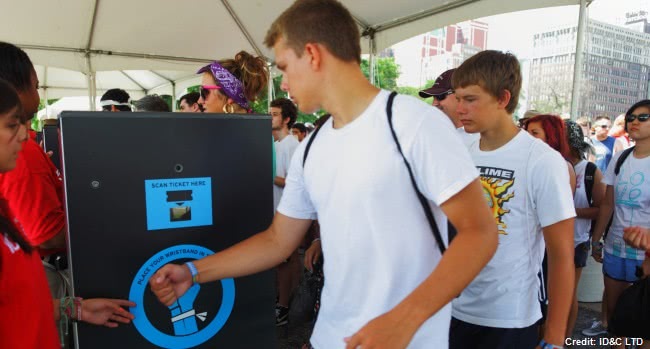Participants of a UK music festival were made the guinea pigs in an interesting experiment where every entrant was made to wear microchip devices for the first time, in a trial of new electronic wristbands’ functionality for use at major music events.
The BBC reports that the 15,000 in attendance at the Welsh Wakestock Music Festival to see the likes of Calvin Harris and Dizzee Rascale, were fitted with the electronic wristbands that contained RFID (Radio Frequency Identification) microchips, similar technology that’s used in London’s Oyster card and Melbourne’s own Myki public transport swipe cards.
Festival-goers essentially ‘swiped’ in and out of areas at the site by scanning their wristbands at turnstiles and handheld devices, enabling not only for the organisers to monitor the data, but designed to cut down on ticket scalping and speeding up the inevitable ticket queues.
The microchips can be cancelled if they’re lost or stolen, and they’re designers touted they’d ensure a “cleaner experience” for festival-goers.
Fans were also able to pre-load their devices with funds to pay for food, drink and booze as well as using social media networks to ‘check in’ at the festival.
The electronic wristbands had been used on a small pocket of concert-goers in the UK before, most recently at the Isle Of Wight and Wireless festivals as well as a Red Hot Chili Peppers gig, but this is the first time the technology had been used on such a large scale; acting as a full-scale trial for the wristbands, with a view to rolling them out to other major music festivals.
Wakestock festival organiser, Stuart Galbraith welcomed the trial, “the benefits are huge” he says, “this will be the future of festivals.” The advantage of tracking the data accumulated by the digital wristbands was another advantage, though admitting that installing the technology was “fairly expensive.”
“The only reason we’re able to use it this year is because we’ve had a commercial sponsor cover the cost,” said Galbraith, “as it becomes wider, it’ll become a lot cheaper.” Denying that the cost would be passed onto the cost of tickets and the consumer.
Another festival organiser who’s considering embracing the ‘digital ticket’ revolution is Michael Eavis, responsible for the UK’s iconic Glastonbury festival. He’s considering implementing the electronic wristbands , telling the BBC he though the technology was “incredible” but was concerned about it being “too commercial.”
While according to NME, Michael Benn, boss for the equally eminent Reading and Leeds festivals has expressed his interest in introducing the wristbands at future events. Quoted as saying, “I’m certainly going to look at the electronic wristband there is no doubt about that at all.”
“It is the way forward that’s for sure,” Benn says, adding that he’d already set up a similar “cashless festival in Norway, “similar to Reading And Leeds and people don’t bat an eyelid there, they think its normal.”
Given the importance of Australia’s own festival season, and the influence of major festivals like Glastonbury and Reading, it’s not too much of a stretch to think that we’ll see similar technology making an appearance in the not-too-distant future.
Organisers for Harvest festival already detailed a new ticketless system for it’s Melbourne leg, introducing a special card for Harvest Foundation Members containing customer details that will become the ticket “for all future Harvest Events“. Implemented both to help cut down on ticketing and delivery costs and as a sign of good faith that they’d promise to not repeat the mistakes of last year’s event; plagued by understaffed food tents and severe queueing for toilets and booze.
Imagine a Harvest with ‘swiping’ on for food and drinks, essentially eradicating the obscure token system and potentially reducing the long lines for that precious amber and much-needed potty break.
Way of the future? Sounds good to us.

































